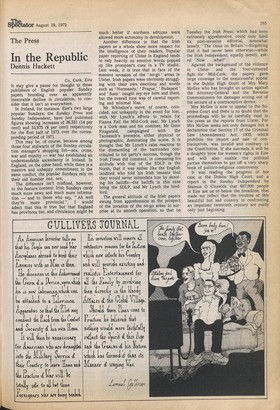The Press
In the Republic
Dennis Hackett
Co. Cork, Eire It may give a pause for thought to those publishers of English popular Sunday papers brooding over an apparently inexorable decline in circulation, to consider that it isn't so everywhere.
In Ireland, for instance. Eire's two large popular Sundays, the Sunday Press and Sunday Independent, have just published figures showing increases of 36,331 (14 per cent) and 53,875 (8 per cent) respectively for the first half of 1972 over the corresponding period of 1971.
This may be, of course, because among those four stalwarts of the Sunday circulation manager's shopping list—sex, crime, war and royalty — war has established an understandable ascendancy in Ireland. In England, on the other hand, while there is a massive and unhappy commitment in the same conflict, the popular Sundays rely on their old number one, sex.
The difference isn't confined, however, to the feature content: Irish Sundays carry much more news and much more information — and to those who say, " Ah well they're more provincial ", I would admit that this is true but that England has provinces too, and circulation might be much better if northern editions were allowed more autonomy in development.
Another difference is that the Irish papers as a whole show more respect for the intelligence of their readers. Popular paper reporting of Ulster in England tends to rely heavily on emotive words popped up like prompter's cues in a TV studio. Last week, it is true that in face of the massive invasion of the ' no-go ' areas in Ulster, Irish papers were obviously struggling with their own emotions and words such as 'Normandy,' Prague," Budapest ' and ' Suez ' caught my eye here and there, but the overall tone was of careful reporting and minimal bias.
Mr Whitelaw's move, of course, coincided, not unhappily in the event for him, with Mr Lynch's efforts to retain for Fianna Fail the Mid-Cork seat. Mr Lynch is a Cork man and his nominee, Mr Gene Fitzgerald, campaigned with the Taoiseach's presence, either physical or photographic, dominating the scene. It is thought that Mr Lynch's calm reaction to the dismantling of the barricades contributed to his party's success, though the Irish Times did comment, in comparing his attitude with that of the SDLP in the North, that it was rather like the English landlord, who told his Irish tenants that they would never intimidate him by shooting his bailiffs—the bailiffs in this case being the SDLP, and Mr Lynch the landlord.
The general attitude of the Irish papers swung from apprehension at the prospect of the invasion of the no-go areas to surprise at its smooth operation, so that on
Tuesday the Irish Press, which had been extremely apprehensive, could only label its post-invasion editorial, somewhat lamely, 'The Onus on Britain '—forgetting that it had never been otherwise—while the Irish Independent, equally lamely, asked: ' Now . . what?'
Against the background of the violence in Ulster and the four-cornered fight for Mid-Cork, the papers gave large coverage to the unsuccessful appeal in the Dublin High Court of Mrs Mary McGee who has brought an action against the Attorney-General and the Revenue Commissioners for damages arising out of the seizure of a contraceptive device.
Mrs McGee is now to appeal to the Supreme Court and there is no doubt that the proceedings will be as carefully read in the press as the reports from Ulster. For Mrs McGee seeks not only damages but a declaration that Section 17 of the Criminal Law (Amendment) Act, 1935, which prohibits the import and sale of contraceptives, was invalid and contrary to the Constitution. If she succeeds it will be a doughty blow for women's rights in Eire and will also enable the political parties themselves to get off a very sharp hook of politico-religious controversy.
It was reading the progress of her case in the Dublin High Court, and a report in the Sunday Independent by Seamus 0 Cinneide that 687,000 people in Eire are on or below the breadline, that made me reflect that the troubles of this beautiful but sad country in confronting an impatient twentieth century are really only just beginning.
































 Previous page
Previous page